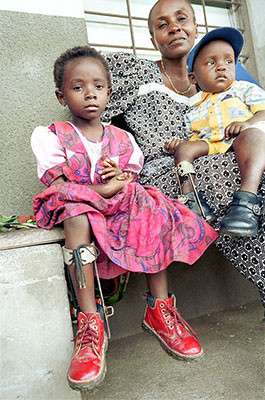Could polio make a comeback?

It's one of the most famous global public health success stories of the 20th century: the near-eradication of polio, the dreaded childhood disease that paralyzed or killed more than half a million people around the world annually at its peak in the 1940s and 50s. Following mass immunization campaigns with two kinds of polio vaccine—Jonas Salk's inactivated polio virus and Albert Sabin's live-attenuated vaccine—the annual number of polio cases plummeted in the United States.
The fight against polio in developing nations has been a more protracted battle, but great strides have been made. Since the 1988 World Health Assembly resolution to eradicate the disease, polio cases worldwide have dropped to fewer than 700.
However, in early May 2014, the World Health Organization (WHO) released a statement pointing to an alarming spike in the international spread of wild poliovirus, originating from three "hot spot" nations, Pakistan, Syria and Cameroon. The WHO called this an "international health emergency" requiring "extraordinary measures."
Could we be facing another polio epidemic?
"Vaccination protects against the disease for a lifetime," says Craig Cameron, who holds Penn State's Eberly Chair in Biochemistry and Molecular Biology. "And the WHO, Centers for Disease Control and their partners have the will to vaccinate every individual that can be reached.
The problem is access, which remains difficult in some cases. Often it's war that is a major limitation. Sometimes the barrier is due to ignorance, but in others to stupidity. In some countries, governments still feel that this effort is contrived to do harm to their people."
Until this year, global vaccination campaigns—at a cost of up to one billion dollars per year—have kept the transmission rates very low, notes Cameron. So what has changed recently? Experts point to disruptions such as the war in Syria, which has interrupted vaccination programs and allowed the virus to return. In Pakistan, the Taliban has attacked public health workers trying to vaccinate children.
The WHO concurs that "Pakistan, Cameroon, and the Syrian Arab Republic pose the greatest risk of further wild poliovirus exportations in 2014," and has urged that "all residents and long-term visitors receive a dose of polio vaccine at least a month before traveling internationally and should require proof of vaccination to travel."
The risk for citizens in more economically developed nations remains very low, stresses Cameron. "Outbreaks in this country do occur on rare occasion," he notes, especially among communities that do not vaccinate (the Amish are a notable example). However, for the general population, "as long as one gets vaccinated, there is no need to worry about your personal risk."
That doesn't mean there's no cause for worry about the larger global picture. After the International Health Regulations committee convened an emergency meeting in late April 2014, the WHO issued the unequivocal statement that "if unchecked, this situation could result in failure to eradicate globally one of the world's most serious vaccine preventable diseases." The committee unanimously agreed to declare the surge of polio a "Public Health Emergency of International Concern."
It's sobering news, agrees Cameron. "There are many of us that believe it will be impossible to eradicate poliovirus globally because of the sociopolitical circumstances such as those that we are witnessing at present."
















